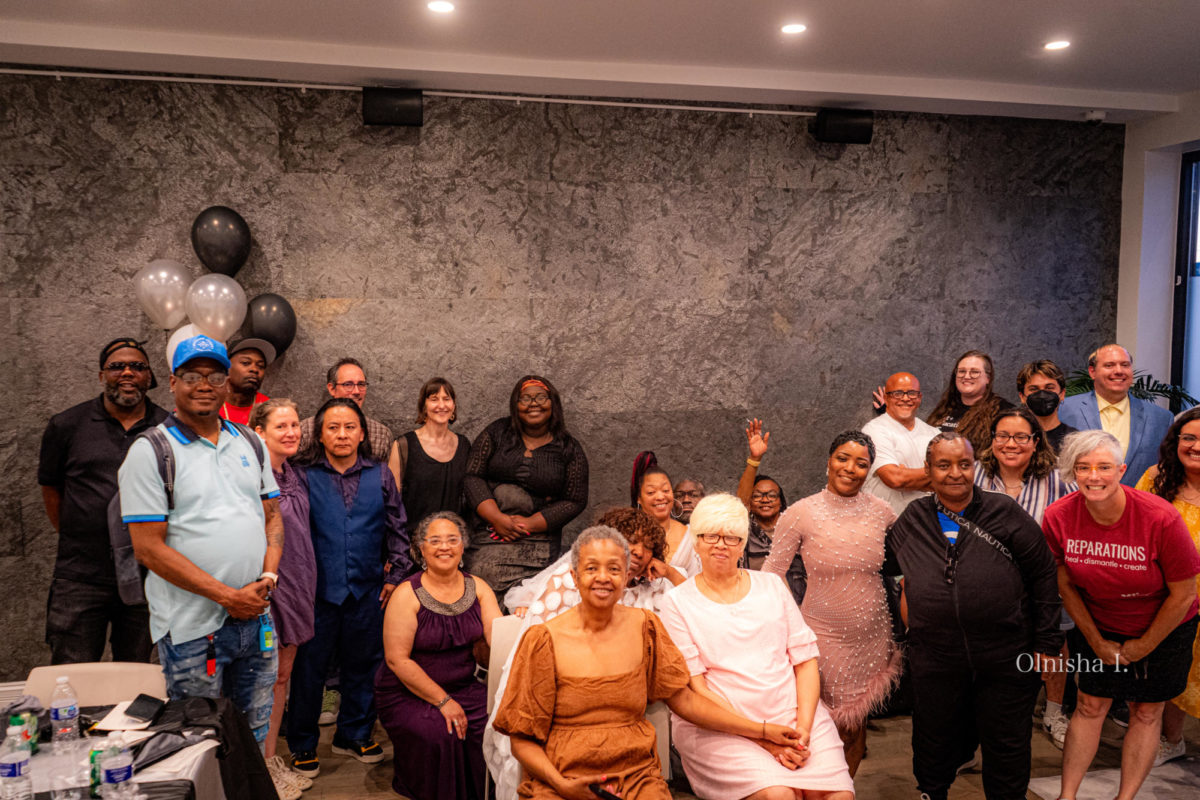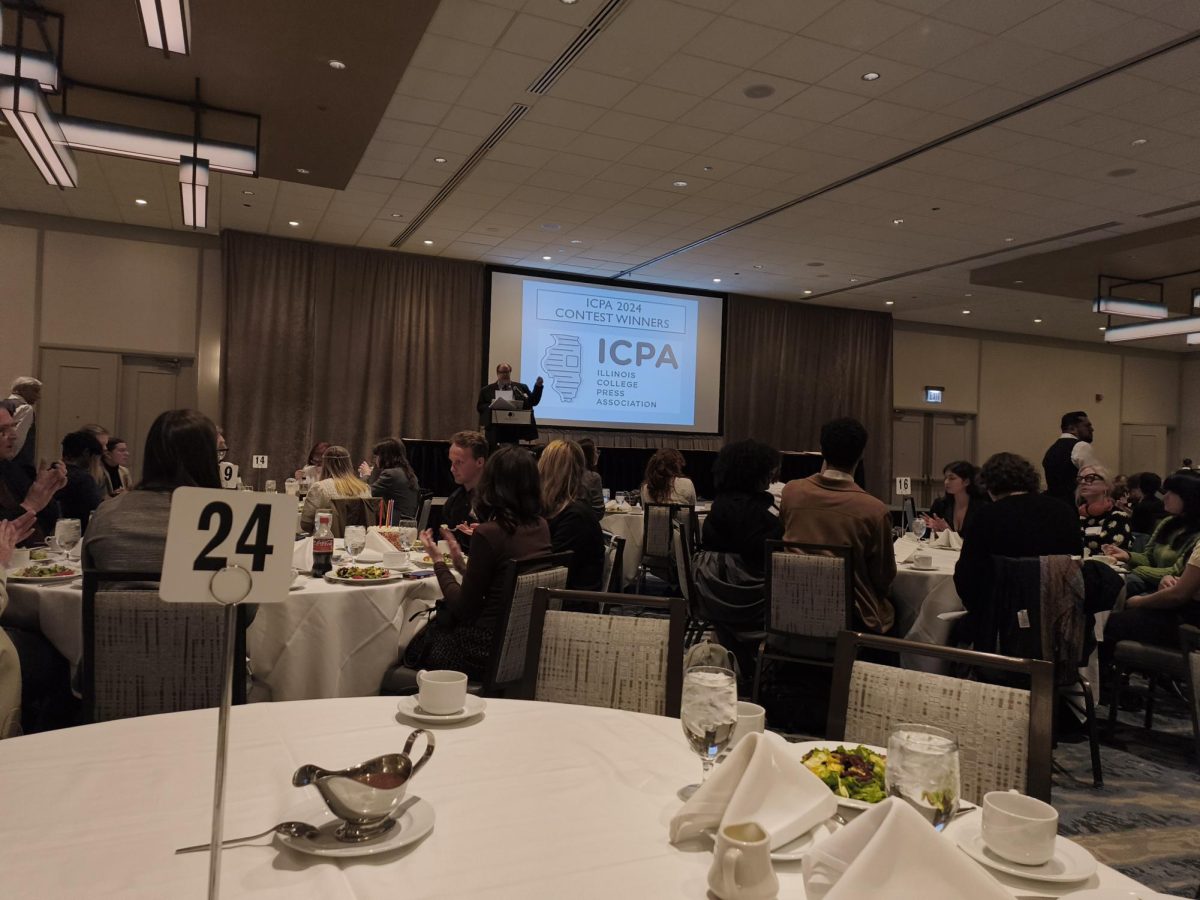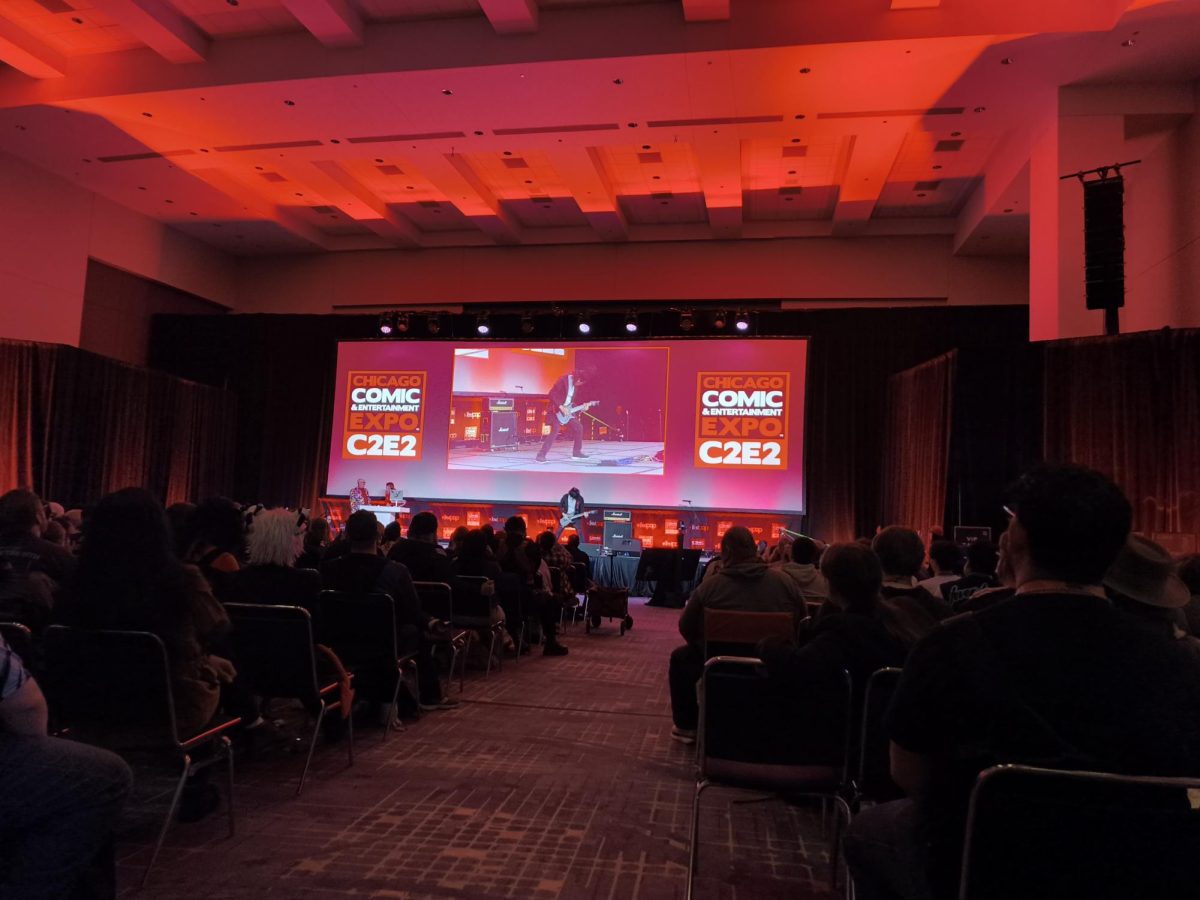Family and friends of Robert Curry, an NEIU student in the University Without Walls (UWW) program at Stateville Prison, in partnership with Parole Illinois, hosted a Sneakerball Fundraiser to bring about awareness for incarcerated people as well as abuses and inequalities in the criminal justice system.
The event took place in a rented storefront on North Avenue in Chicago’s Humboldt Park Neighborhood. Attendees included community activists, formerly incarcerated people, their families, friends, Prison + Neighborhood Arts/Education Project (PNAP) participants, faculty, students from local universities, and supporters of their cause.
Upon entering the rented storefront, people were greeted by Barbara Brown, Robert Curry’s partner. Attendees enjoyed delicious comfort foods, including fried chicken, mac and cheese, rice, rolls, sponge cake, and other staples. Alcohol was offered to attendees over 21. Two African-American dancers, Alandrea and Devin Mosely, a cousin of Curry, performed flawlessly together in the art of tap and a rhythmic artistic dance fashion.
Several representatives from community activist groups spoke about the criminal justice system. Shari Stone from Parole Illinois discussed how many people incarcerated in the criminal justice system have long sentences and the opportunity for these individuals to receive a second chance despite their past.
Nancy Alvarez stated, “We need changes in the judicial system…racial inequalities exist, especially with black/brown people being over-incarcerated.” Alvarez’s brother Ignacio has been incarcerated in Stateville Prison for ten years since age 21.
Tiffany Dawson spoke about a family member named David. David has been in prison for 25 years, in addition to his son recently. It is difficult for both a father and son to be incarcerated simultaneously, according to Dawson.
Dr. Christina Rivers from DePaul University and a representative from Chicago Votes gave a presentation on House Bill 39. Currently, Illinois is the only state legislature with a potential bill to allow incarcerated persons to vote in state and federal elections. Rivers explained, “Judges and District Attorneys are elected by the people.” People have a say in democracy, and those that make judicial laws and decisions can help to stop injustice and inequality in the court system, Rivers later mentioned.
According to the Chicago Votes website, “House Bill 39 & Senate Bill 1483 Voting in Prison, restores voting rights to people incarcerated in Illinois prisons, post-conviction. If passed, House Bill 39 (HB39) would make Illinois the first state to restore voting rights to people in prison.”
During the discussion portion, 3 to 4 fundraiser participants echoed similar messages of wanting incarcerated people who had been falsely convicted to have a second chance at freedom, as people constantly evolve and learn from experiences.
Curry has faced setbacks with his appeal and legal defense. He was convicted at age 27 and sentenced to 50 plus 15 years for murder. According to the 2015 Appellate Court Ruling People vs. Curry, there are two audio recordings of another man with a criminal record named Joshua Taylor confessing to the crime. Since Illinois law dictates two-party consent, this recording was considered inadmissible during the appeal by presiding Judge Dennis J. Porter from the Appellate Court of Illinois. Ballistic evidence was also recovered by police matching a firearm owned by a man named Willie Sanders. The defense at trial neglected to call alibi witnesses, according to the motion filed. Evidence also not considered was the number of shooters. Witnesses stated there was one shooter, not two, as erroneously presented at the original trial.
Multiple miscarriages of justice are present in Justice Porter’s courtroom. Multiple people convicted under Porter’s authority have claimed innocence, and some were exonerated after incarceration for life sentences. Two notable high-profile cases include Angel Rodriguez and Roosevelt Myles.
In 1998, Rodriguez was convicted of murder and sentenced to 60 years in prison by Judge Porter. During the original trial, a police detective falsely identified Rodriguez as the shooter of a grocery store owner during a robbery despite other witnesses agreeing that Rodriguez did not precisely fit the robber’s physical description. Witnesses agreed his nose was smaller. Police detectives did not mention this at trial. In 2000, Rodriguez’s conviction was reversed on appeal, and he was released from prison.
Myles was convicted of murder and falsely imprisoned for almost 30 years, and exonerated in 2022. Justice Carol Howard ordered the exoneration due to a different interpretation of the witness testimony convicting Myles. Justice Porter, however, continued to not enforce deadlines for 4 motion hearings including 70 delays filed by the defense, keeping Myles unjustly incarcerated as a result despite having the authority to do so. Justice Porter also allegedly kept Myles behind bars by delaying decisions to grant an evidentiary hearing in the legal battle to free Myles in 2019. Justice Porter retired in 2021.
A colleague and Cook County Associate Judge Stanley Sacks was quoted in the Chicago Daily Law Bulletin saying, “He’s genuinely concerned about the court system and wants to make it better and makes it better by being a part of it.” Questions remain about how the overall court system was improved under Justice Porter’s tenure.
“Incarcerated persons are human beings. People do indeed change with time,” stated Pastor Stevenson, a local community activist and former incarcerated person.








